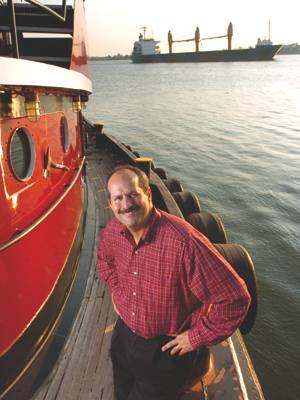"We Need to Talk About the Jones Act ..."
This is an open letter to the offshore oil and gas industry operating on the outer continental shelf.
Dear Customer:
We need to talk about the Jones Act and the other cabotage laws that require you to use U.S.-flag vessels to transport cargo and people from one part of to another. You already know that, as the association that represents the owners and operators of flag workboats, we are willing to fight to protect the Jones Act. And we know that a lot of you don’t like the Jones Act and wish it didn’t exist.
However, I am writing you today to urge you to rethink the Jones Act and recognize that using vessels makes good business sense.
First let me make clear that we believe that the companies that work in ’s offshore oilpatch want to obey the laws of this country and if you understand the requirements of the Jones Act, you will live by them. The penalties of disobeying it are simply too high.
On that front, there is no chance that the Jones Act is going to go away any time soon, especially for the offshore sector. In the past four years, Congress has passed bills that strengthen or beef up enforcement of the flag requirement six times. What’s more, those bills were specifically aimed at vessels working in the offshore oil patch. On the enforcement side, the Customs and Border Protection Service and the Coast Guard have begun working in much closer coordination on enforcement issues and have held joint training sessions on Jones Act violations. Congress wants this law enforced and the agencies want to enforce it.
But enough about the law. There are reasons that flag vessels are good for your business. The first is safety. Working together, the American boat operators and their oil and gas customers are responsible for one of the safest offshore environments found in the world and one of the safest sectors of the maritime industry. Those flag vessels undergo some of the most rigorous regulatory oversight of any flag state and the mariners on those boats have gone through one of the most extensive background checks and drug and alcohol testing found anywhere.
The next reason is security. American offshore supply vessels have security plans and their mariners have gone through security checks. Although reporting regulations are being developed by the Coast Guard, foreign vessels working in the Gulf of Mexico can still avoid telling the government who’s on board or even reporting their presence in waters. The offshore industry works in enough political hot spots around the globe to respect the security you find off our coasts. We hope you share our view that the hundreds of facilities in our Outer Continental Shelf are too valuable to gamble with.
The quality of the mariners on boats is another reason. From long experience, the workboat industry produces mariners who are specifically trained for their jobs. Workboats require unique skills at boat handling and cargo operations. The American system of training mariners produces vessel captains who possess those skills. Other countries take a different approach, training their mariners to run deep-draft ships and expecting them to pick up the nuances of offshore operations once they are on the job. The question you should ask yourself is: How important are those skills at two in the morning when an OSV is working in close proximity to your multi-million-dollar rig or your billion-dollar platform?
Finally, there is the taxman to worry about. New interpretations of section 883 of the IRS code clearly indicate that foreign vessels working on our outer continental shelf are not engaged in what is referred to as “international operation of ships” and are not eligible for what is referred to as the “Reciprocal Exemption” allowing them to avoid paying income tax. This means that you as the charterer will likely be required to pay the IRS a withholding on the income from the job at the 30% rate. In one well publicized case, a charterer had to pay the IRS nearly a million dollars in withholdings and penalties for just one foreign vessel’s work in waters. That’s a lot of money to pay at the back end to save a few bucks on the front end.
That is the bottom line. With the Jones Act fleet you get a known level of quality, safety and security. If you try to get around the Jones Act, you may save a little, but you risk losing a lot.
So what were the arguments against the Jones Act again?
Ken Wells is the President of the Offshore Marine Service Association (OMSA). OMSA is the national trade association that represents the owners of flag vessels that work in the offshore oil and gas sector. These workboats, including offshore supply vessels, crewboats, liftboats, utility boats and conventional tugboats and barges serve as the lifeline to ’s offshore energy supply.














